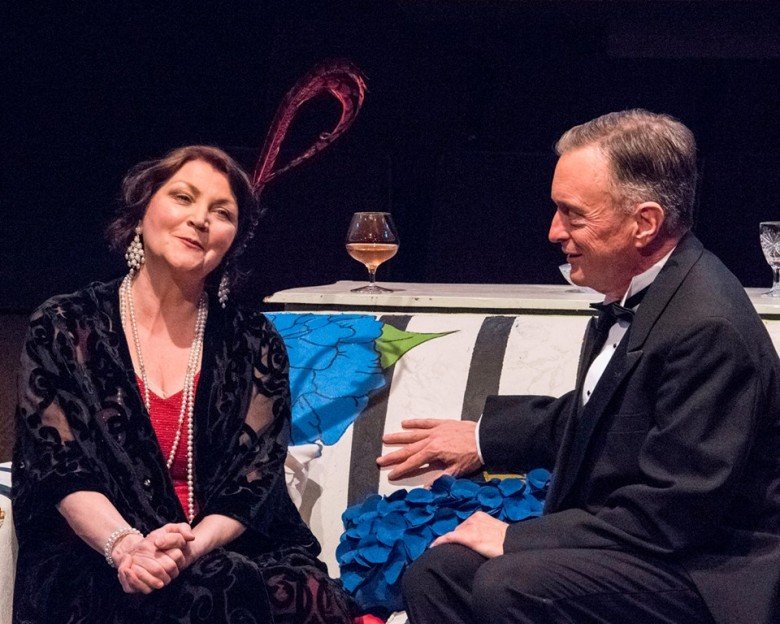Hay Fever, by Noel Coward, is a clever and rather silly comedy in three acts now playing at Irish Classical Theatre Company. It is about a wealthy, artistic family in England in the 1920s with an unusual bonding ritual. The family name is Bliss, as in “ignorance is…”, as in being unaware or oblivious to the fact that the existence of other people is not solely for their own amusement or to serve as foils to strengthen the family ties.
Mr. Coward is said to have based this play on the lives of some of his friends. If that is the case, I hope for his sake that he had other, less narcissistic and more considerate people in his life to offset those depicted here. While the family is very amusing to watch in this well-acted production by ICTC, there really is not any there there. The surface is all there is to these folk, so being in their company can be exhausting, as their weekend houseguests learn to their chagrin after a day and a night at their summer house.
The Bliss family consists of the matriarch, Judith (Josephine Hogan), a recently retired successful theater actress; her husband, David (David Oliver), a successful author of what he refers to as “very bad novels;” and their young adult children, Sorel (Marisa Caruso), and Simon (Jordan Levit), although calling any of this family adults is something of a misnomer.
The setup is that each family member invites a guest for the weekend without the knowledge of the others. The guests are Sandy (Jacob Albarella), a smitten younger man invited by Judith; Myra (Hilary Walker), a “femme fatale” type older woman invited by Simon; Richard (David Lundy), an older “diplomatist” invited by Sorel; and Jackie (Melissa Levin), a younger woman described by David as a flapper, invited by him. The cast is rounded out by the long-suffering and very annoyed dresser-cum-maid, Clara (Andrea Golhardt).
As the evening progresses, each family member goes off with a guest they did not invite, and each falls madly in love with that person. Really? No. It is all part of the game. All of the interactions with the guests are more or less an amusement and a bonding exercise for the family, with the ritual itself being the acting out of Judith’s play within the play. And the guests have their own opportunity to bond the morning after the very confusing and distressing - to them - events of the night before.
Judith, as the matriarch of the family, is played with great panache by Josephine Hogan, after a slow start in the first act. Once I realized (about two minutes in) that everything anyone in this family says or does is always and only for effect, her drama queen Judith felt right on, as did the over-the-top giddiness of Sorel and Simon. Mr. Oliver’s David has a disinterested and vague persona in contrast to Judith’s dramatic one. Ms. Caruso’s Sorel acts as the family apologist, explaining that “we none of us ever mean anything,” while Mr. Levin’s Simon is completely engaged in the game.
Mr. Albarella’s eagerness to please as Sandy, who is willing to be in love with either Judith or Sorel, it all being the same to him, is very fine in his role, as is Mr. Lundy, who is the bemused and ultimately confused diplomat also eager to please. Ms. Levin’s Jackie is very un-flapper-like in her fear of participating in a word game and of the goings-on in general, while Ms. Walker’s Myra is aghast at the proceedings. Ms. Gollhardt’s Clara buzzes around with trays while giving looks that express her opinion of the whole business.
The set is a delight, beautifully staged by Paul Bostaph. All of the action takes place in the “hall,” a room whimsically furnished in black and white checks and stripes, with color added in striped chair legs and pillows and here and there on the furniture. Even the piano is checkered. Above the set, fringed and furred lampshades in many colors and designs add to the ambiance of this appealing and playful room. Between acts, the furniture is moved to a different place in the theater-in-the-round so that each section of the audience can see it in its entirety, and so the actors can play to different angles. Kudos.
Direction is by Gordon McCall. He gives his actors free reign, while keeping things moving along. Everything worked very well on opening night with a few minor acting hiccups early on.
Hay Fever, which is an early play by Mr. Coward, is over the top – the acting, the setup, and the play itself. It is meant to be that way and it is - a farcical comedy of bad manners, the people who have them and the people affected by them. It is at ICTC until June 25th.

